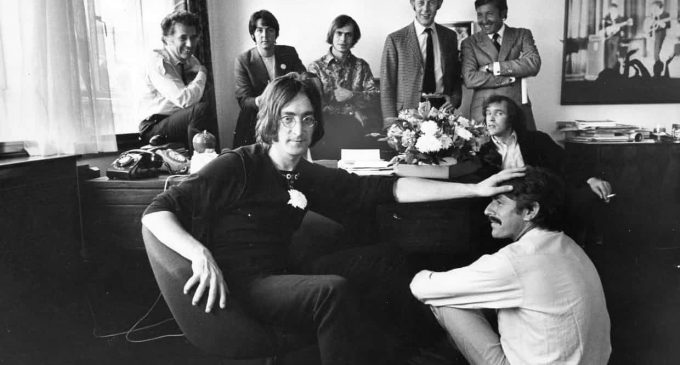As Time Goes By by Derek Taylor review – a poignant insight into the Beatles | Books | The Guardian

In April 1968, Derek Taylor and Paul McCartney were in New York discussing how a new McCartney song, Thingumybob, would be best served played by a brass band. “The best band in the land,” said Paul. So it was that both were in Saltaire, Yorkshire, at 10am the following Sunday – “a fine northern time of day for a brass band” – recording the song with the Black Dyke Mills Band. On the way back to London that night, the pair stopped at a pub in the village of Harrold, Bedfordshire, where McCartney sat at the pub piano to play a new song he’d written called Hey Jude. “There was never a long wait,” says Taylor, “between the musical will and the recorded deed.”
First published in 1972, now with an excellent introductory essay by Jon Savage, Derek Taylor’s As Time Goes By was the first, and remains the sharpest, memoir written by one of the Beatles’ inner circle. Taylor had been press officer for the Beatles for less than a year in 1964, but that was when the role had mattered most, at the height of Beatlemania.
Formerly a local newspaper man on the Wirral, he was tough and talented, dapper and witty, and seen as important enough that he was welcomed back into the fold when the group launched the Apple record label (and boutique, and film company, and electronics division) in 1968. The years in between were transformational for the Beatles, but hadn’t been uneventful for Taylor.
He was persuaded to move to California with his family of six in 1965, and his Beatles connection, which he couldn’t shake, even after they split, meant he found work easily. He did press for the Beach Boys, just as Brian Wilson decided to retire from touring, shut himself away and produce Pet Sounds. He also worked with the Byrds, when they broke through – and peaked commercially – with Mr Tambourine Man in 1965, having to navigate the truculent band through a UK tour he described as “all the time, aggro and panic”. He notes wisely that while the Byrds were sneered at for tuning up on stage before playing, this was only “like any decent group in the 70s… the English then were not too patient or hip”.
By 1967, Taylor was helping to set up the Monterey pop festival, which effectively launched the heavy rock era, and was taking on press for the Doors, Mamas and Papas, Buffalo Springfield and Captain Beefheart. He even tried to make a rock star out of Mae West, who revealed to him she had never made a cup of coffee in her life. It eventually proved too much and, facing burnout and an enormous tax bill (which the Beach Boys graciously covered), Taylor was ready to move back to Britain, where he oversaw the Apple press office and had to manage the Beatles’ messy demise for the media.
Taylor was an elegant man, and an elegant writer, who knew when to deploy swearwords for maximum impact. Among the best chapters is one that describes a day in the life of the Apple office, which sounds relentless and miserable. In an attempt to make sense of the Apple circus, Taylor allows New York businessman Allen Klein to meet the Beatles – the mea culpa chapter 1969: Written Before It Was Too Late is heartbreaking, as Taylor admits his part in the Beatles’ breakup: “Workers sign in and out, the laughing is over… what have I done? Our Apple is all chewed up.”
It’s easy with hindsight to think that Taylor had the easiest job in the world, working with such significant material, the absolute cream of 60s pop. Then again, it should be remembered that Pet Sounds was a commercial disaster in America and that its high reputation in Britain was partially managed by Taylor, who carefully gave copies to friends (the Beatles, the Stones) who might help its cause. When John Lennon is talking up a record as the greatest thing he’s ever heard, you’ve done a great press job. By the end of 1966, the Beach Boys even beat the Beatles to best group in Melody Maker’s readers’ poll. “I don’t know why,” Taylor says modestly, “they’d been around for years.”
As Time Goes By works as an industry insider companion to Nik Cohn’s Awopbopaloobop Alopbamboom, which saw the 60s’ pop explosion from a fan’s perspective. Both Taylor and Cohn started as journalists, but explain how the edges blurred – everyone involved in the scene was a fan, everyone had ideas, things moved forward fast on a diet of brandy breakfasts, boozy record launch lunches, acid-inspired shows and spliffs at home. The speed at which the Beatles and their contemporaries lived was unsustainable. “Did it happen, all of it, or was it a dream?” Taylor asks.
The book ends on 1 January 1970, the day he left Apple; a new era of acoustic sincerity quickly replaced the dream state and mourning for the 60s began almost immediately.
• As Time Goes By by Derek Taylor is published by Faber Social (£9.99). To order a copy for £8.49 go to guardianbookshop.com or call 0330 333 6846. Free UK p&p over £10, online orders only. Phone orders min p&p of £1.99
Source: As Time Goes By by Derek Taylor review – a poignant insight into the Beatles | Books | The Guardian




There are no comments at the moment, do you want to add one?
Write a comment